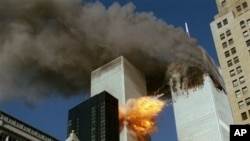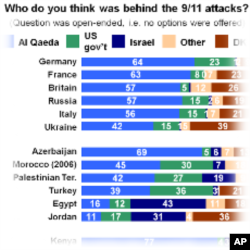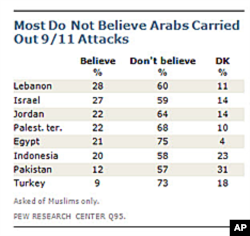In the decade since television cameras caught hijacked airliners crashing into buildings in New York and outside Washington, conspiracy theories about who was behind the terror attacks have persisted around the world. And some of these theories question whether the al-Qaida terror network had anything to do with the 9/11 attacks. People’s attitudes about the United States often influence their beliefs about 9/11 more than the facts themselves.
Al-Qaida's role
The United States and most governments around the world have long blamed al-Qaida for the events of September 11, 2001. The late al-Qaida leader, Osama bin Laden, even admitted responsibility for the attacks.
But during the past decade, some people have argued against this explanation. In fact, if you begin typing "9/11" into an Internet search engine, one of the top five choices that pops up is "9/11 conspiracy." And some of the more bizarre conspiracies go so far as to accuse the United States of attacking itself, or speculate that Israel carried out the attacks in a plot to discredit Muslims.
International opinion
In 2008, researchers with the Program on International Policy Attitudes spoke with people in 21 countries around the world, asking them who they thought was behind the 9/11 attacks.
PIPA director Stephen Kull says the survey results were surprising.
“About half of them had a majority that said something like al-Qaida," Kull said. "And even among countries like our NATO allies, the majorities were not very large, in no cases more than two-thirds. So what we have here really is a lack of consensus around the world.”
Attitude factor
Kull says researchers then correlated the survey results with the peoples’ attitudes toward the United States. Those with a more negative attitude were less inclined to believe that al-Qaida carried out the attacks.
Graeme Bannerman, formerly of the U.S. Senate Foreign Relations Committee, says he believes the study’s findings would have been different immediately after 9/11.
“I think the rest of the world supported us at first. I think everybody was American. Everybody sided with us," Bannerman said. "People who normally were not our best friends were saying, ‘We’re with you. We understand what you’ve been through.’”
But he says the United States lost much of this goodwill when it went to war with Iraq, a country most believe was not involved in the September 11 attacks.
Muslim opinion
After the U.S.-Iraq war, negative attitudes toward the United States increased sharply in Muslim countries. In 2008, a majority of people polled in the Middle East said either that al-Qaida was not responsible for 9/11, or that they did not know who was.
A Pew Research Center survey this year found that a majority of Muslims polled still do not believe Arabs were responsible.
Ishtiaq Ahmad a Pakistani expert in international relations, says negative attitudes toward America in the Muslim world are not only caused by U.S. foreign policies.
Ahmad says ruling elites, especially in Pakistan, encourage those negative attitudes by playing down U.S. assistance and blaming America and the West for their own domestic failures.
“Basically, there is public anger against the rulers and they find ways and means to shift this anger to other great powers such as the United States. The same has been the case in Egypt, in Saudi Arabia, in the Gulf, in Pakistan. And therefore this conspiracy mindset, even some 10 years after the events of 9/11 one notices has not gone away, rather in some aspects it has aggravated,” he explained.
But Ahmad says it may be possible to improve the situation. He says a U.S. military withdrawal from Afghanistan and lower profile in other Muslim regions, combined with increased trade and assistance, could begin changing attitudes toward Washington - and possibly put some of the more bizarre 9/11 conspiracy theories to rest.


















